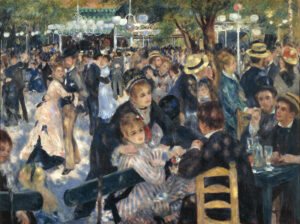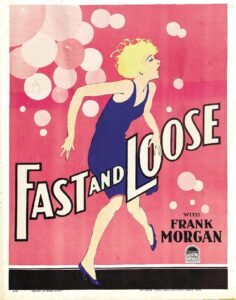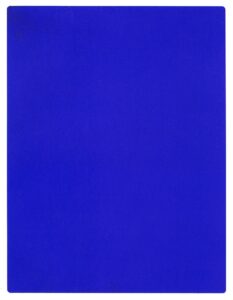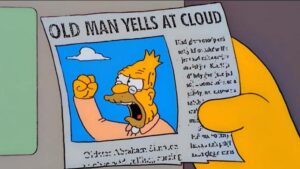 No one alive today can recall the mood of what we in the States call, variously “The Gilded Age,” “The Gay 90s,”and “The Progressive Era.” In England we had The late-Victorian and Edwardian Eras, or in France The Belle Époque. For the most part the era merited warm memories. I see it, at this distance, as top hats and lovely dresses, champagne and dancing, cigars and caviar, Renoir boating-parties and dinners by the Seine.
No one alive today can recall the mood of what we in the States call, variously “The Gilded Age,” “The Gay 90s,”and “The Progressive Era.” In England we had The late-Victorian and Edwardian Eras, or in France The Belle Époque. For the most part the era merited warm memories. I see it, at this distance, as top hats and lovely dresses, champagne and dancing, cigars and caviar, Renoir boating-parties and dinners by the Seine.
A few talented grumps disagreed; Mark Twain and co-author Charles Dudley Warner perceived and named The Gilded Age for a crass shallowness, the equivalent of the golden-escalator rides of our time. For those of means and artistic sensibilities, however, The Belle Époque seems to have been a rather splendid time to be alive. Everywhere new ideas abounded. Consider the cultural movements such as Art Nouveau, daring ideas in music, dance, photography, philosophy, or physics. Imagine how Einstein’s theories challenged settled notions of space and time. Close to my heart, literary modernism upended what novels would do.
In academic reading, students of literature and history might run across our metaphor, “The Beautiful Time” in references to the arts and politics before The Great War we now call World War I. Mechanized horrors of trench warfare, mustard gas, artillery barrages, infantry charging machine guns, Zeppelin-bombings of London, and more lay just over the horizon like submerged U-Boats. In reading R.W.B. Lewis’ magisterial biography of novelist Edith Wharton, I find it stunning how stunned she, and most of her friends, were by the outbreak of war. Their times simply seemed too civilized, unlike our fearful era, for a global conflict. Frankly, we live in dark times and our media-feeds turn a profit reminding us of that.
Eleven decades ago, however, our counterparts lacked 24/7 news and were not distracted by the dopamine-dispensers of our ridiculous, addictive phones. Yet their newspapers provided quick reporting of a looming, then unfolding disaster in Europe. So it continues to surprise me how otherwise sensitive and perceptive people were surprised by the outbreak of war.
Glancing though an entry at the National Archives, I ran across the very moment when a famous quotation by Britain’s Foreign Secretary marked the end of The Belle Époque:
On 3 August 1914 Sir Edward Grey made his famous quote: ‘The lamps are going out all over Europe, we shall not see them lit again in our lifetime’. He was speaking to his friend, the journalist John Alfred Spender, editor of the Westminster Gazette, in Grey’s room in the Foreign Office. Looking out from his window, across St. James’ Park, it was dusk and the first of the gas lights along the Mall were being lit. The next day Grey would have to face the Cabinet and to persuade them that the time had now come to declare war on Germany.
This powerful image, one that haunted Churchill enough to appear in his writing, captures the mood of late 1914 very well. I do wonder, however, if our era of seemingly endless gloom had a time of light and laughter as its counterpoint? I turn to experts on nostalgia for that. The abrupt rupture 9/11 made in our lives might provide one such contrast, but that tragedy is older now than all my students.
These seem to me glum thoughts in January. Even if foolishly, let’s instead look forward to Spring and the potential for change. It’s always present, perhaps in hiding, but those lamps never go out. Maybe a new Belle Époque lies ahead for us?
If you have a word or metaphor you enjoy, send them by e-mail (jessid -at- richmond -dot- edu) or leaving a comment below.
See all of our Metaphors of the Month here and Words of the Week here.
Image: from Wikipedia, Pierre-Auguste Renoir, Dance at Le Moulin de la Galette (Bal du moulin de la Galette), 1876, Musée d’Orsay
 Edith Wharton, one of my favorite novelists, wrote a juvenile novel called Fast and Loose, and later she made it a plot point in one of her published works. When reading that, I had expected this metaphor to be a modern one she employed in the late 1800s. Yet I found, on some delving into the OED’s entry, a first example from the year 1555, though one from two years later may be more readable, given how much English spelling has changed in half a millennium: “Of a new maried studient that plaied fast or lose.”
Edith Wharton, one of my favorite novelists, wrote a juvenile novel called Fast and Loose, and later she made it a plot point in one of her published works. When reading that, I had expected this metaphor to be a modern one she employed in the late 1800s. Yet I found, on some delving into the OED’s entry, a first example from the year 1555, though one from two years later may be more readable, given how much English spelling has changed in half a millennium: “Of a new maried studient that plaied fast or lose.”




